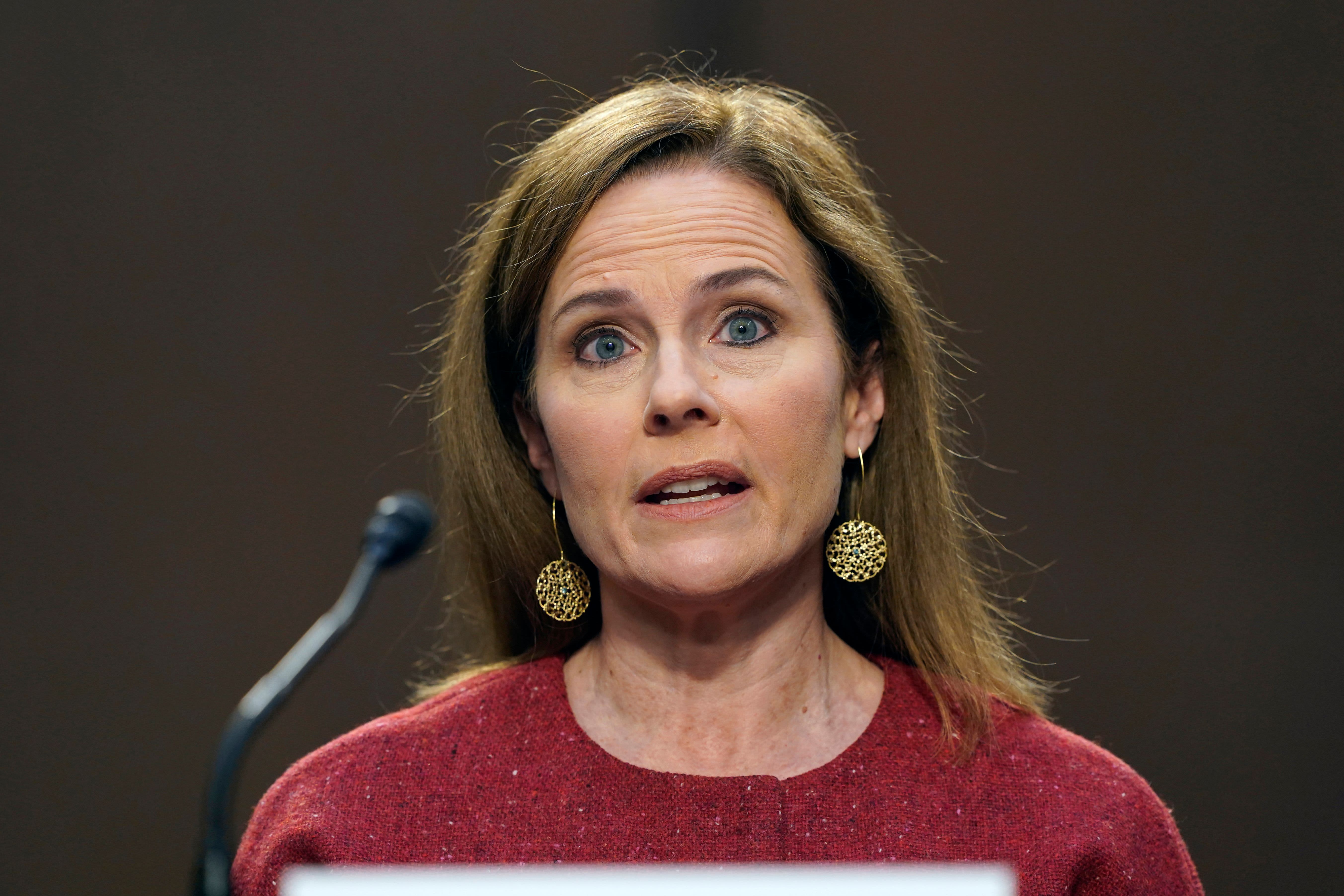
Supreme Court nominee Amy Coney Barrett speaks during a confirmation hearing before the Senate Judiciary Committee, October 13, 2020, on Capitol Hill in Washington, DC.
Susan Walsh | AFP | Getty Images
Judge Amy Coney Barrett got her first shot to address questions live from members of the Senate Judiciary Committee on Tuesday, the second day of the Trump appointee’s Supreme Court confirmation hearings.
The 7th U.S. Circuit Court of Appeals judge spent the first two hours of the hearing fielding questions on abortion, the Second Amendment, her view of the role of precedent and an upcoming case on the Affordable Care Act, also known as Obamacare.
Following the model set by previous nominees, Barrett largely refused to address whether she believed specific cases, in particular the landmark abortion precedent Roe v. Wade, should be overturned, despite repeated prodding from the committee’s top Democrat, Sen. Dianne Feinstein of California.
Barrett repeatedly assured senators that she had no agenda, but refused to say much more, declining to address even a question about whether President Donald Trump could delay the November election.
Barrett provided her most candid answer in response to a question from Sen. Lindsey Graham, R-S.C., the committee chairman. Graham asked Barrett why she accepted the nomination. She said the process has been “excruciating,” but that she was “committed to the role of law and the role of the Supreme Court in dispensing equal justice for all.”
Tuesday’s format all but guaranteed a long day. Each of the 22 senators on the committee — 12 Republicans and 10 Democrats — have half an hour for questions. Follow-ups will be permitted on Wednesday, and outside groups are expected to address the committee on Thursday.
The hearings, which began at 9 a.m. ET, are expected to stretch until late in the evening. Here are the top moments so far.
Barrett says she will not stroll in ‘like a royal queen’
Graham, who opened the hearings noting that he is facing a reelection challenge in South Carolina, spent a good portion of his allocated question time asking Barrett about her view of the role of “stare decisis,” a Latin phrase meaning “to stand by things decided.”
The doctrine generally means that Supreme Court justices try not to overturn previous cases without good reasons. It has taken on a new significance given Democrats’ worries that Barrett will push to overturn Roe v. Wade if she is confirmed.
Barrett told Graham that she will not be able to march into the Supreme Court and immediately overturn Roe, or other cases.
“Judges can’t just wake up one day and say, ‘I have an agenda, I like guns, I hate guns, I like abortion, I hate abortion,’ and walk in like a royal queen and impose their will on the world,” Barrett said.
Later, pressed by Feinstein on whether she agreed with the late Justice Antonin Scalia, for whom she clerked, who said that the court’s abortion precedents should be overturned, Barrett demurred at least three times.
“Whether I say I love it or I hate it, it signals to litigants that I may tilt one way or another in a pending case,” Barrett said.
Senate Judiciary Committee Chairman Sen. Lindsey Graham (R-SC) speaks during the confirmation hearing for U.S. Supreme Court nominee Judge Amy Coney before the Senate Judiciary Committee on Capitol Hill in Washington, D.C., U.S., October 13, 2020.
Susan Walsh | Reuters
Process has been ‘excruciating,’ Barrett says
Barrett got her first opportunity to speak about the personal challenges of the confirmation process in response to a question from Graham about why she accepted Trump’s nomination.
“This is a really difficult, some might say excruciating process,” Barrett said. “We knew that our lives would be combed over for any negative detail, we knew our faith would be caricatured, we knew our family would be attacked.”
“What sane person would go through with that if there wasn’t a benefit on the other slide?” she asked.
“The benefit I think is I’m committed to the role of law and the role of the Supreme Court in dispensing equal justice for all,” she said. “I am not the only person who could do this job, but I was asked, and it would be difficult for anyone.”
“My family is all in on that because they share my belief in the rule of law,” Barrett said.
Barrett won’t say whether Trump can delay election
In response to a question from Feinstein about whether Trump could lawfully delay the Nov. 3 election, Barrett said she couldn’t answer without becoming essentially a “legal pundit.”
“Senator, if that question ever came before me, I would need to hear arguments from the litigants, and read briefs, and consult with my law clerks, and talk to my colleagues, and go through the opinion writing process,” Barrett told Feinstein.
“If I gave off the cuff answers I would be basically a legal pundit and I don’t think we want judges to be legal pundits, I think we want judges to approach cases thoughtfully and with an open mind,” she added.
Trump, who is behind in national and state surveys against Biden, has pushed for a delay to the election, arguing without evidence that mail-in voting is vulnerable to mass fraud. The Constitution provides Congress with the power to set the date of the presidential election.
Senator Dianne Feinstein (D-CA) speaks during U.S. Supreme Court nominee Judge Amy Coney Barrett’s confirmation hearing before the Senate Judiciary Committee on Capitol Hill in Washington, D.C., U.S., October 13, 2020.
Stefani Reynolds | Reuters
This is a developing story. Check back for updates.




